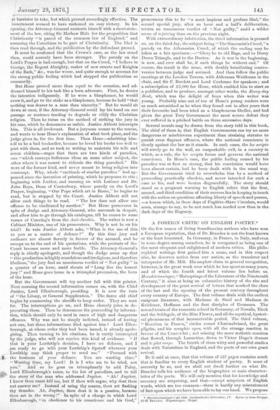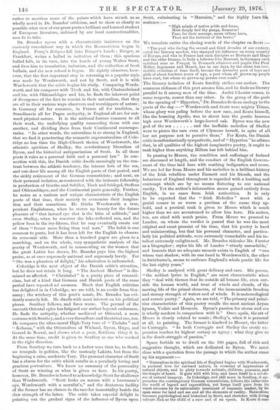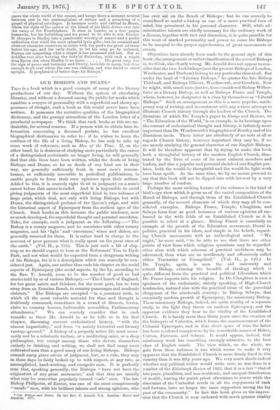A FOREIGN CRITIC ON ENGLISH POETRY.* OF the few names
of living Scandinavian authors who have won a European reputation, that of Dr. Brandes is not the least known or the least honoured. In Germany, in France, in Italy, and even in some degree among ourselves, he is recognised as being one of the most eloquent and enlightened of modern critics. His philo- sophical writings first gained him a name, and in this respect also, he deserves notice from our nation, as the translator and interpreter of Mr. Mill. His amplest claim to general recognition, however, is the great work over which he has spent so many years, and of which the fourth and latest volume lies before us. Hovedutriimninger," Mainsprings of the Literature of the Nineteenth Century," it aims at being an exhaustive history of the rise and development of the great revival of letters that marked the close of the last and the opening of the present century throughout every country of Europe. The first volume deals with the earliest emigrant literature, with Madame de Staiil and Madame de Kriidener, Hoffman and the first disciples of Rousseau. The second treats of the romantic school in Germany, of Novalis, Tieck and the Schlegels, of the Blue Flower, and all the mystical, hysteri- cal phenomena of that inconceivable period. The third volume, "Reaction in France," circles round Chateaubriand, the great pilgrim, and his seraphic epos, with all the strange reaction in favour of the Concordat ; not missing the more a3sthetic reaction that flowed, through Lamartiue, down to Victor Ilugo's dramas and le gilet rouge. The fourth of these witty and powerful studios deals with Naturalism in England, and the poets of our own great revival.
Be it said at once, that this volume of 627 pages contains much that is familiar to every English student of poetry. It must of necessity be so, and we shall not dwell further on what Dr. Brandes tells his audience of the biographies or main character- istics of the poets. We will only mention that his knowledge and accuracy arc surprising, and that—except misprints of English words, which are too common—there is hardly any misstatement of fact upon which we have been able to lay our hand. We propose
• Horestromninger I del 19de Aarhundredes Mere:fur, Ir. Byron ng hang Gruppe. At G. BrindeR. Ooponhagen: Hegel.
rather to mention some of the points which have struck us as wholly novel in Dr. Brandes' criticism, and to show as clearly as possible what view of our great poets a brilliant and learned student of European literature, unbiased by our local conventionalities, sees fit to take.
Dr. Brandes opens with a characteristic insistence on the curiously roundabout way in which the Romanticism began in
England. Percy's lieligoes fall into Burger's hands ; Burger, at
Frankfort, writes a ballad in imitation of them ; this spurious ballad falls, in its turn, into the hands of young Walter Scott, and tires him to translation, imitation, and the collection of fresh ballads, and the new school is begun. Ile rightly observes, how- ever, that the first important step in returning to a popular style was made by Wordsworth, and not by Scott, and it is with Wordsworth that the critic begins his study. Comparing Words- worth and his compeers with 'Beck and his, with Chateaubriand and his, with OhlenschlUger and his, he finds the inherent point of divergence of the first to consist in their naturalism,-that they are all in their various ways observers and worshippers of nature ; in Germany all for romance, in France all for tradition, in Scandinavia all for Pagan antiquity, in England all are for out- ward physical nature. It is the national feature common to all their work, the underlying quality connecting them with one another, and dividing them from their Continental contempo- raries. "In other words, the naturalism is so strong in England, that we find it penetrating the romantic supernaturalism of Cole- ridge no less than the high-Church theism of Wordsworth, the atheistic spiritism of Shelley, the revolutionary liberalism of Byron, and the historical antiquarianism of Scott. In all these poets it rules as a personal faith and a personal law." In con- nection with this, the Danish critic dwells amusingly on the con- trast between the athletic tendency, the intense love of the sea, and out-door life among all the English poets of that period, and the sickly retirement of the German romanticists; and next, on their personal isolation, as contrasted with the intimate fellowship in production of Goethe and Schiller, Tieck and Schlegel, Steffens and Ohlenschliiger, and the Continental poets generally. Further, he notes as a curious and unique characteristic of the English poets of that time, their anxiety to economise their imagina- tion and their sensations. He thinks Wordsworth a true, prudent Englishman, when he stores up beauty for the future
pleasure of "that inward eye that is the bliss of solitude," and even Shelley, when he reserves the lake-reflected sun, and the
yellow bees in the ivy-bloom, that he may eventually create out
of them "forms more living than real man." The habit is one common to poets, but it has been left for the English to observe
its economic side. More than a hundred pages are given to a searching, and on the whole, very sympathetic analysis of the poetry of Wordsworth, and in commenting on the women that the great Lakist has drawn, Dr. Brandes pays him the highest praise, as at once supremely national and supremely lovely. For " She was a phantom of delight," his admiration is unbounded.
Coleridge is the next object of the Danish critic's attention, but he does not retain it long. "The Ancient Mariner" is dis- missed as affected. " Christabel " is a pretty piece of romanti-
cism, but of a kind that German and Danish poets of the same period have repeated ad nauseam. Much that English criticism
has delighted in in Coleridge, we are told, is an exotic from Ger- many; the witchery of this poet's music, Dr. Braudes has evi- dently scarcely felt. Ile dwells with most interest on his political pieces. Southey follows, and fares worse. The perusal of the uncouth Oriental epics has fatigued our author beyond endurance. He finds the antiquity, whether medimval or Oriental, a mere costume with Southey, and a very threadbare and theatrical one, too.
He compares the ultra-moral High-Tory tone of " Thalaba " and " Kehama," with the Orieutalism of Wieland, Byron, Hugo, and Gerard de Nerval, and shows what a poor, fictitious thing it is. At the same time, credit is given to Southey as one who worked in the right direction.
From Southey we turn back to a better man than he, to Scott, no renegade in politics, like the unsteady Lakists, but from the beginning a calm, moderate Tory. The personal character of Scott has a charm for the critic which results in a peculiarly loving and gracious portraiture. We know no summary of the personality of Scott so winning as what is given us here. In his poetry, however, Dr. Brandes is forced to acknowledge Scott far shallower than Wordsworth. "Scott looks on nature with a huntsman's eye, 'Wordsworth with a moralist's," and the dexterous facility of the former has no chance in the race for immortality beside the slow strength of the latter. The critic takes especial delight in pointing out the gradual signs of the influence of Byron upon Scott, culminating in " Marmion," and the highly Lara-lile sentence :-
"High minds of native pride and force, Most deeply feel thy pangs, Remorse ! Fear, for their scourge, mean villans have, Thou art the torturer of the brave."
We translate entire the closing words of the chapter on Scott :— "The poet who during the second and third decades of our century, ruled the literary market, who stamped his influence on every country of Europe, and who in France had such disciples as Merinitie and Hugo and the elder Dumas, in Italy a follower like Manzoni, in Germany Foch spiritual sons as Foucitut, in Denmark admirers and pupils like Peal Ingemann and Hauch, has in oar days, by the silent but irre- sistible criticism of time itself, become the favourite poet of boys and girls of about fourteen years of ago, a poet whom all grown-up people have read, but whom no grown-up person over reafls."
The literary isolation of Keats forcibly strikes our author. The sensuous richness of this poet amazes him, and he finds no literary parallel to it among men of the time. Andrd Chenier comes, in some respects, nearer than any other. In the group of the gods in the opening of "Hyperion," Dr. Brandes ficds an analogy to the poets of the day :—" Wordsworth and Scott were mighty Titans, whose glory was paling before the new race, and Keats himself, like the beaming Apollo, was to shoot into the poetic heavens high over Wordsworth's large-leaved oak. Byron was the new
god of the sea and the ineffable melodies of Shelley were to pierce the ears even of Clymene herself, in spite of all her set purpose not to perceive them." For Keats, the Danish critic is enthusiastically sympathetic, and of "Hyperion "he affirms that, in all qualities of the highest imaginative poetry, it ought to rank higher than anything Milton has left behind him.
In passing to Moore, the condition and sufferings of Ireland are discussed at length, and the conduct of the English Govern- ment of the time laid bare with scathing indignation and scorn. We are led far from Moore and his melodies in a brilliant history of the Irish rebellion under Emmett and his friends, and the behaviour of England throughout is regarded with a loathing and contempt which are by no means flattering to our national vanity. Yet the author's information seems gained entirely from English, in no eases from Irish authorities. It is only to be expected that the "Irish Melodies" meet with a genial censor in so warm a partisan of the cause they up- hold, and a poetical rank is given to Moore which is much higher than we are accustomed to allow him here. Ilia satires, too, are cited with mach praise. From Moore we proceed to Landor, on whom the verdict is passed that he was the most original and exact prosaiat of his time, that his poetry is hard and uninteresting, but that his personal character, and particu- larly his political attitude, were extremely remarkable and his in- tellect extremely enlightened: Mr. Brandes ridicules Mr. Forster as a biographer ; styles his life of Landor "utterly unreadable,' and laments that no adequate memoir exists in English of "one whose vast shadow, with its one hand in Wordsworth's, the other in Swinburne's, seems to embrace England's whole poetic life for the last eighty years."
Shelley is analysed with great delicacy and care. His poems, "the noblest lyrics in English," are most characteristic when they "deal with themes that lie outside all human life, even out- side the human world, and treat of winds and clouds, of the moving life of the primal elements, of the immeasurable freedom and stormy strength of waters and of winds. It is meteorological and cosmic poetry." Again, we are told, "The primary and primi- tive characteristic of this poetry recalls the most ancient Aryan hymns, Vedaic and Homeric. Byron's passion for storm and sea is wholly modern in comparison with it." Once again, the art of Moore is closely related to music ; ShellOy's, when it is personal at all, to painting. The former is kindred to Mozart, the latter to Correggio. "In both Correggio and Shelley the erotic ex- pression reaches its highest ecstasy or agony ; what they give us is the death-struggle of passion."
Space forbids us to dwell on the 160 pages, full of rich and suggestive thought, which are dedicated to Byron. We must close with a quotation from the passage in which the author sums up his argument :—
" Naturalism in the spiritual life of England begins with Wordsworth, in pastoral love for outward nature, in economy of impressions of natural objects, and in piety towards animals, children, peasants, and the simple of heart. It goes wild with him, and loses itself in a cul-de- sac of natural imagery. In Coleridge, and still more in Southey, it ap- proaches the contemporary German romanticism, follows the latter into the world of legend and superstition, yet keeps itself pure from its worst excesses by its naturalistic treatment of romantic matter, by its open sense for land and sea and all the elements of reality. Naturalism becomes psychological and historical in Scott, and sketches with living colours Man as the child of a race and of an epoch. In Keats it con-
quers the whole world of the senses, and hangs there a moment neutral between rest in the contemplation of nature and a preaching of a gospel of physical privileges. It becomes erotic and radical in Moore, whom the sight of the sorrow of the island of his birth drives over into the camp of the Freethinkers. It rises in Lander as a free pagan humanity, but too forbidding and too proud to be able to win Europe. It changes in Shelley into a pantheistic worship of nature and a poetic radicalism that wield the most splendid lyric gifts ; but its cosmical and abstract character contrives, in union with the poet's too great advance before his age, and his early death, to let his song go by unheard, Europe not suspecting what a singer it has possessed and lost. But as Achilles rose after burning the body:of Patroclus, with such a might
does Byron rise when Shelley is no more Ma great song was the sign of peace and harmony and liberty, invisible to many, but clear enough to all over whom the atm was shining, and who dared to stand upright. It prophesied of better days for Europe."








































 Previous page
Previous page